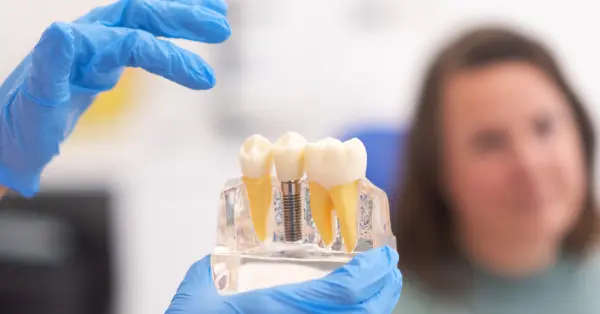Healing Timeline for Dental Implants in Washington
Dental implants represent an extended investment in your smile and dental well-being. If you're planning to undergo the procedure, one of the most common questions is: "How long will it take to heal?" The answer varies depending on each person, including their general well-being, the number of implants, and whether other surgeries, such as bone grafting, are required.
In our previous blog, we discussed the expert tips to help choose a good oral surgeon for a dental implant procedure. In this blog, we’ll walk you through a clear and realistic healing timeline so you can know what to expect after getting dental implants.
Step-by-Step Recovery Timeline of Dental Implants
Below is a general overview of the healing process in five stages:
1. First 24–48 Hours – Immediate Recovery
This is the most sensitive stage of healing. Mild swelling, bruising, and slight bleeding are expected to occur immediately following implant surgery. Your oral surgeon will provide instructions to minimize discomfort, including taking prescribed medications and avoiding hard or hot foods.
What to do:
- Rest as much as possible
- Apply ice packs for swelling
- Eat soft foods, such as yogurt, stew, or mashed potatoes
If your procedure included options for sedation dentistry in Washington, be sure to have someone escort you home and monitor you for the first few hours.
2. Week 1 – Tissue Recovery Begins
During this stage, your gum tissue will start healing around the implant post. While pain should gradually reduce, tenderness and swelling may persist for several days. Any sutures used may begin dissolving on their own, depending on the type used.
What to monitor:
- Continue a soft diet
- Rinse with salt water to aid healing
- Brush gently around the implant site
Avoid smoking or drinking through a straw, as the suction can disturb the healing area.
3. Weeks 2 to 4 – Stabilization Phase
Around this time, discomfort should be minimal. Your gums will have healed considerably, and your oral surgeon will likely check the implant’s stability at your follow-up visit. While you may feel "normal," the bone beneath is still fusing with the implant in a process called osseointegration.
What to expect:
- Gum inflammation continues to reduce
- You can reintroduce firmer foods gradually
- Maintain excellent oral hygiene
If you had bone grafting in Washington prior to the implant, the healing at this stage may be a bit slower, but it's a crucial part of ensuring long-term stability.
4. Months 2 to 3 – Integration of Bones
This is the critical behind-the-scenes stage. The implant and jawbone begin forming a strong bond. Though you may feel fully healed externally, patience is key. Your surgeon may take X-rays to evaluate bone integration.
During this phase:
- You'll likely feel no pain
- Avoid biting on the implant site
- Temporary crowns may be placed in some cases
This silent phase is what sets dental implants apart from other options—it creates a stable foundation for the permanent crown.
5. Month 4 and Beyond – Final Restoration
Typically, your jawbone and implant have bonded by this point. The final phase will be to return to your oral surgeon to receive a final crown. Once fitted, the newly acquired tooth will look and operate exactly like a natural one.
Final steps:
- The implant is examined for durability and fitting
- Your custom crown is securely placed
- Normal eating and brushing habits resume
Your surgeon will ensure the implant fits seamlessly with your natural bite and adjacent teeth.
Conclusion
Healing after dental implants is a gradual journey—but a rewarding one. With the right care and expertise, patients in Washington can enjoy a permanent, natural-looking solution for missing teeth.
If you're considering providers of dental implants in Washington, choose a surgical team that specializes in personalized treatment plans and cutting-edge technology. Whether you need advanced procedures like bone grafting or comfort-focused options such as sedation dentistry, trust your smile to professionals who prioritize your comfort and long-term results. Call now at (202) 610 0600!






4.9 Stars
based on 134 reviews
5 Stars
based on 11 reviews
5 Stars
based on 11 ratings